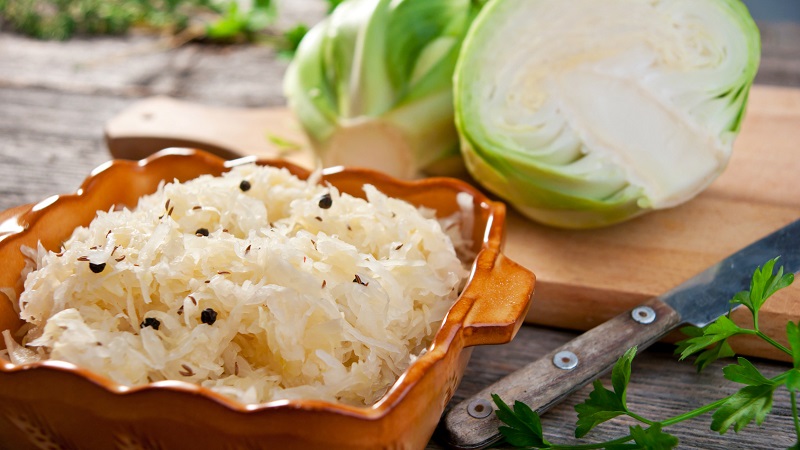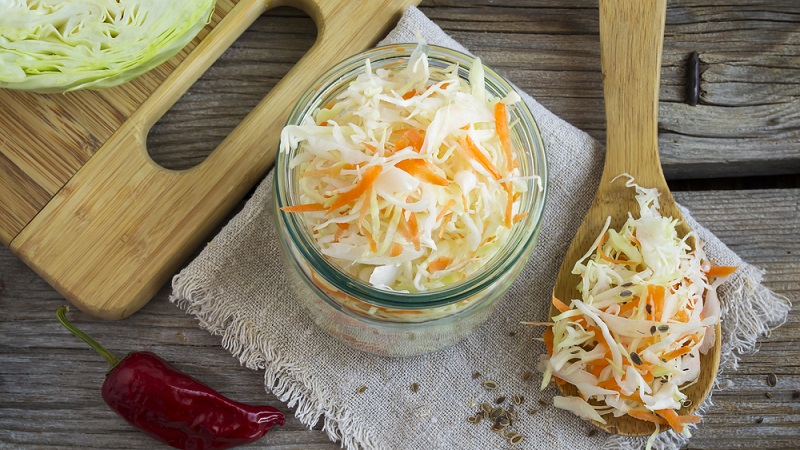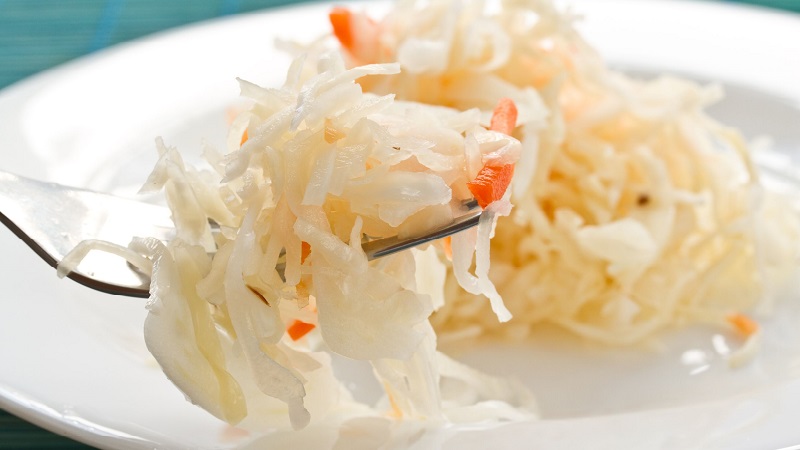Sauerkraut for women: what is useful and when is it contraindicated, how, in what form and quantity to use it
For hundreds of years, sauerkraut has occupied a well-deserved place on everyday and festive tables. Not only in Russia, but also in Germany, China, Belarus, this is one of the national dishes. The use of the product helps to lose weight, maintain health until old age, strengthen the digestive and nervous systems. Consider how useful sauerkraut for women and men.
The content of the article
Chemical composition

Through fermentation, organic matter is broken down into simpler forms that are better absorbed by the body. Sauerkraut contains vitamins and minerals in a form that can be processed.
100 g of sauerkraut contains:
- 0.91 g protein;
- 0.14 g fat;
- 4.3 g of carbohydrates.
Energy value - 19 kcal. The product is 92% water and almost 3% healthy fiber.
Vitamins and Minerals:
- B1, B2, B4, B6 normalize the activity of the central nervous system;
- Beta Carotene Promotes Eye Health
- C supports immunity, protects against colds, promotes the absorption of iron;
- iron, calcium, magnesium, sodium, phosphorus, zinc are involved in the metabolism and stable functioning of internal organs.
Regular consumption of such a dish relieves the symptoms of bronchial asthma. During fermentation, sulforaphane is formed in sauerkraut. This organic compound prevents airway inflammation and lung damage, and has antibacterial and oncoprotective effects.
Reference. The largest amount (1153 mg per 100 g) of glucoraphanin, the precursor of sulforaphane, is found in broccoli sprouts.

The benefits of sauerkraut
Daily use of this product normalizes the activity of the gastrointestinal tract and the nervous system, improves heart function, cleanses blood vessels, and stimulates immunity. Due to the content of lactic acid bacteria, sauerkraut has a beneficial effect on the intestinal microflora, relieves bloating, and promotes the treatment of colitis.
In medical and dietary nutrition, the dish is widely used for:
- prevention of cancer and cardiovascular diseases thanks to antioxidants and probiotics: the former prevent cancer, the latter lower cholesterol;
- increase in hemoglobin levels due to the presence of iron;
- treatment of vitamin deficiency due to a rich set of vitamins.
In cosmetology it is used for:
- rejuvenation thanks to carotene and vitamin A, which act as antioxidants;
- healthier teeth and nails: calcium, magnesium, zinc and B vitamins contribute to this.
Numerous studies in volunteers have shown excellent results in losing weight and preventing the risk of type II diabetes, as sauerkraut interferes with the absorption of fat by the intestinal cells. With prolonged use (from 12 to 24 weeks), the subjects showed a persistent weight loss while maintaining efficiency, vitality and appetite.
For women
The benefits of sauerkraut for women:
- vitamin A maintains skin tone, stimulates the development of epidermal cells, relieves edema;
- ascorbic acid makes wrinkles less noticeable, participates in the formation of collagen;
- folic acid reduces the manifestations of toxicosis during pregnancy, promotes the formation of fetal tissues;
- due to its low calorie content, the product is effective for losing weight;
- fiber cleanses the intestines of toxins, probiotics normalize microflora;
- zinc and magnesium alleviate the condition during menopause, the former is involved in the work of the endocrine system.
Masks from brine rejuvenate the skin, relieve acne, discolor freckles and age spots.

For men
The benefits of sauerkraut are manifested for the body not only for women, but also for men. Regular consumption of snacks:
- strengthens the immune system thanks to vitamin C and probiotics;
- increases libido and improves potency, since zinc and vitamin A stimulate the production of the male sex hormone testosterone.
The brine has choleretic and detoxifying properties, therefore it is effective for a hangover.
Basic rules of use
Sauerkraut is included in the diet from 3-4 years old until old age. It is used as an independent snack and as a side dish for meat products, they make first and second courses on its basis, they drink brine in small portions.
The best form for assimilation by the body is salad with onions and vegetable oil. In this form, the dish better copes with the task of enriching the intestinal microflora, cleans the digestive tract more effectively, and contains the maximum amount of beneficial bacteria.
Important! Onions are contraindicated for gastritis and ulcers.
If you use sauerkraut as a main or additional side dish for meat dishes, it will prevent the intestinal walls from assimilating lipids. As a result, the body will receive only the building material for muscles - protein, and not harmful, hard-to-digest fats that settle on the stomach and sides.
Cabbage soup and borscht made from sauerkraut are not so useful, but still more valuable than with fresh vegetables.

To obtain the correct product when fermenting, follow these recommendations:
- The dishes are used enameled, without chips and cracks, or wooden, well cleaned, washed and dried.
- Heads of cabbage are taken tight, healthy, without signs of mold and rot.
- Cabbage is chopped coarsely, since a heavily chopped vegetable loses some of its nutrients.
- Use a minimum saltdo not add vinegar.
- The best way to preserve is by grinding with salt before getting juice.
- To add value to the dish, add carrots, cranberries, and lingonberries.
- Shredded vegetables are placed in a fermentation vessel, covered with a wooden board, a load (4-5 kg) is placed on top and left warm.
- Every day, they pierce the snack to the bottom with a long wooden skewer, promoting the release of carbon dioxide. It prevents mold from multiplying.
- The dish is fermented for at least 2 weeks. Then they put it in the refrigerator or cellar.
- Store no more than 10 months.
Sauerkraut has a positive effect on brain activity: it improves memory, reduces the manifestations of depression and anxiety. However, it should not be eaten while taking antidepressants: this increases the risk of severe hypertensive crisis, since monoamine oxidase (MAO) inhibitors are incompatible with tyramine contained in fermented vegetables.
Contraindications and possible harm

With undoubted benefits, sauerkraut should not be abused. The optimal daily rate is 200 g. With a systematic excess, undesirable consequences are possible: flatulence, pressure surges, edema, heartburn.
It is not recommended to use sauerkraut when:
- hypertension;
- stomach ulcer in the acute stage;
- flatulence;
- diseases of the kidneys and thyroid gland;
- pancreatitis.
Violation of the cooking technology and improper storage of the product can cause severe poisoning.
Conclusion
Sauerkraut is a storehouse of nutrients for the body. It increases immunity, prolongs youth, normalizes metabolism and the functioning of the nervous system, and reduces excess weight. However, if there are contraindications, it is better to refrain from eating snacks or consult a doctor.